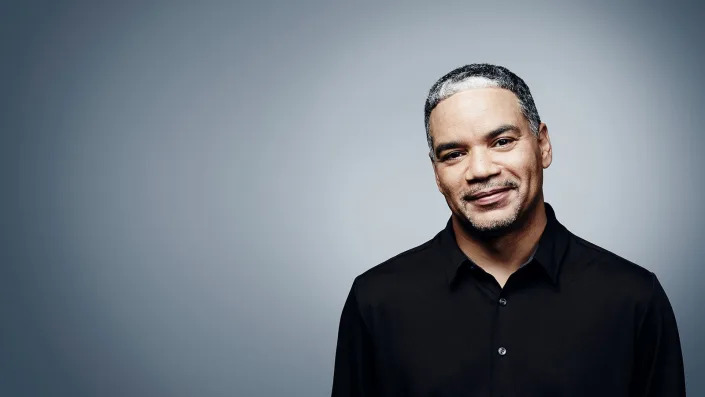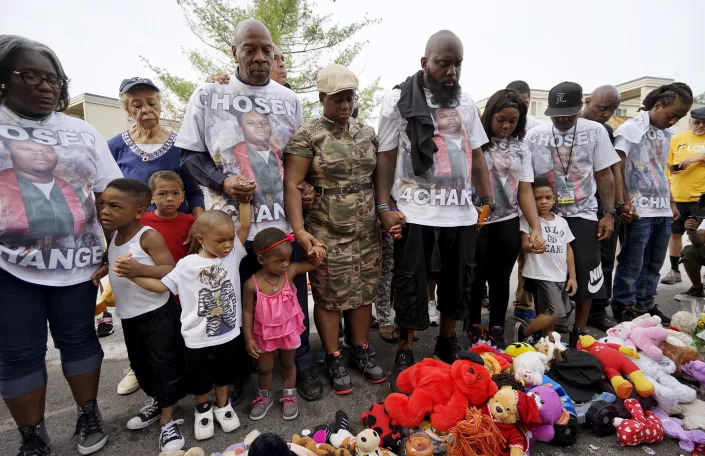And why social justice movements have so often "fizzled out."
Jon Ward
·Chief National Correspondent
CNN
Fri, June 23, 2023

CNN's John Blake became "pretty jaded and almost cynical" about the state of race relations in America, but writing about his own family history made him more hopeful. (John Nowak/CNN)
Journalist John Blake has witnessed and written about civil rights for more than three decades, but it wasn’t until he explored his own personal history that he concluded that today’s racial justice movements are missing a key ingredient.
“From my personal experience covering all these racial issues, I have covered one racial reckoning after another that just fizzled out,” said Blake, a senior writer for CNN.
“We write a lot about policy and law and changes in law, and we need to do that,” Blake said in an interview with Yahoo News. “But I think we have forgotten how important it is to create these communities” where people of different races forge friendships and have regular interactions.
“I think that is also an indispensable part of fighting racism, and I think we’ve forgotten that,” he said.
Blake’s new book, “More Than I Imagined: What a Black Man Discovered About the White Mother He Never Knew,” is his story of growing up in Baltimore, often without enough food to eat, without a mom.
A 'closeted biracial' kid
Blake, whose father was African American, said he was a “closeted biracial” kid, who began to mark his mother’s race as Black on school forms even though she was white. That’s because his mom disappeared when he was very young, and he was told that her family didn’t like Black people.
He developed a hostility toward white people, which began to change when Blake met his mother at age 17 and found she had been institutionalized for mental illness for years.
“All these things that I had been taught about white people — all these assumptions — she shattered that within the first 15 minutes of meeting her. She didn’t have to say a word,” he told Yahoo News.
“So I tell people, there are things you can only learn when you’re meeting people, when you’re in contact with people, when you’re in relationship with people. You can’t read a book. You can’t put a Black Lives Matter protest sign on your lawn. You can’t go to diversity workshop. You have to be in a relationship. And once I entered that relationship with my white mom, everything began to change.”

Michael Brown Sr., right of center, father of Michael Brown, who was killed by a Ferguson, Mo., police officer in 2014, prays with family members before a protest march in Ferguson in 2015.
Fri, June 23, 2023
CNN's John Blake became "pretty jaded and almost cynical" about the state of race relations in America, but writing about his own family history made him more hopeful. (John Nowak/CNN)
Journalist John Blake has witnessed and written about civil rights for more than three decades, but it wasn’t until he explored his own personal history that he concluded that today’s racial justice movements are missing a key ingredient.
“From my personal experience covering all these racial issues, I have covered one racial reckoning after another that just fizzled out,” said Blake, a senior writer for CNN.
“We write a lot about policy and law and changes in law, and we need to do that,” Blake said in an interview with Yahoo News. “But I think we have forgotten how important it is to create these communities” where people of different races forge friendships and have regular interactions.
“I think that is also an indispensable part of fighting racism, and I think we’ve forgotten that,” he said.
Blake’s new book, “More Than I Imagined: What a Black Man Discovered About the White Mother He Never Knew,” is his story of growing up in Baltimore, often without enough food to eat, without a mom.
A 'closeted biracial' kid
Blake, whose father was African American, said he was a “closeted biracial” kid, who began to mark his mother’s race as Black on school forms even though she was white. That’s because his mom disappeared when he was very young, and he was told that her family didn’t like Black people.
He developed a hostility toward white people, which began to change when Blake met his mother at age 17 and found she had been institutionalized for mental illness for years.
“All these things that I had been taught about white people — all these assumptions — she shattered that within the first 15 minutes of meeting her. She didn’t have to say a word,” he told Yahoo News.
“So I tell people, there are things you can only learn when you’re meeting people, when you’re in contact with people, when you’re in relationship with people. You can’t read a book. You can’t put a Black Lives Matter protest sign on your lawn. You can’t go to diversity workshop. You have to be in a relationship. And once I entered that relationship with my white mom, everything began to change.”
Michael Brown Sr., right of center, father of Michael Brown, who was killed by a Ferguson, Mo., police officer in 2014, prays with family members before a protest march in Ferguson in 2015.
(Rick Wilking/Reuters)
Blake said he had become “pretty jaded and almost cynical” about the issue of race in America after decades of firsthand experience as a journalist writing about big moments. “The topic will exhaust you. I mean, Ferguson, Charlottesville, all these things I’ve covered, been there. Rodney King protest, I’ve covered it,” he said.
“I do think facts are important, but what I have seen in my life is that facts don’t change people. Relationships do,” Blake said. He said his relationships over time — with relatives from his mother’s family and with white people in racially diverse Christian church congregations — “not only changed me, but it changed white people in a way I never expected.”
Why the George Floyd protests 'fizzled'
“I think we have forgotten that it can’t just be policy, it just can’t be protest. And I think that’s one of the big reasons that the George Floyd protest fizzled,” Blake said. “You got to have people of different races and different points of view coming together and having relationships. I mean, that’s what changed me and my family.”
There are some groups that try to facilitate these kinds of interactions. Braver Angels is one of the best-known organizations. It brings together people of political, class and racial differences, with the goal of helping them discuss their disagreements constructively and of seeing one another’s humanity.
Braver Angels’ national convention next month will feature Utah Gov. Spencer Cox, a Republican; Rep. Dean Phillips, D-Minn.; and former National Institutes of Health Director Francis Collins.
But some experts think modern protest movements lose momentum because society has forgotten how to build effective political movements.
Blake said he had become “pretty jaded and almost cynical” about the issue of race in America after decades of firsthand experience as a journalist writing about big moments. “The topic will exhaust you. I mean, Ferguson, Charlottesville, all these things I’ve covered, been there. Rodney King protest, I’ve covered it,” he said.
“I do think facts are important, but what I have seen in my life is that facts don’t change people. Relationships do,” Blake said. He said his relationships over time — with relatives from his mother’s family and with white people in racially diverse Christian church congregations — “not only changed me, but it changed white people in a way I never expected.”
Why the George Floyd protests 'fizzled'
“I think we have forgotten that it can’t just be policy, it just can’t be protest. And I think that’s one of the big reasons that the George Floyd protest fizzled,” Blake said. “You got to have people of different races and different points of view coming together and having relationships. I mean, that’s what changed me and my family.”
There are some groups that try to facilitate these kinds of interactions. Braver Angels is one of the best-known organizations. It brings together people of political, class and racial differences, with the goal of helping them discuss their disagreements constructively and of seeing one another’s humanity.
Braver Angels’ national convention next month will feature Utah Gov. Spencer Cox, a Republican; Rep. Dean Phillips, D-Minn.; and former National Institutes of Health Director Francis Collins.
But some experts think modern protest movements lose momentum because society has forgotten how to build effective political movements.
The civil rights march in Washington D.C., Aug. 28, 1963.
(Library of Congress/Reuters)
“Expression is not the same as civic action and political action,” said Yuval Levin, director of social, cultural and constitutional studies at the American Enterprise Institute.
“When people want to express a strong political view now ... there’s a tendency to re-create the appearance of a protest movement, but without the underlying institutional infrastructure of a protest movement. So you just show up on the street with signs, and then it all dissipates and goes nowhere,” Levin said in a recent speech.
“But you know, the civil rights movement was not fundamentally about holding up signs. Bringing a million people to Washington in the summer of ’63 was a way of saying, ‘We can bring a million people to the voting booth in November of ’64,’” Levin said. “And it was understood that way. It was a way of showing organizational power, not a way of expressing opinion.”
The ease and speed of internet organizing on mobile phones has made organizing easier and faster, but also less effective, wrote Zeynep Tufekci in her 2017 book “Twitter and Tear Gas: The Power and Fragility of Networked Protest.”
“The ability to use digital tools to rapidly amass large numbers of protesters with a common goal empowers movements,” Tufekci wrote. “Once this large group is formed, however, it struggles because it has sidestepped some of the traditional tasks of organizing.”
“Expression is not the same as civic action and political action,” said Yuval Levin, director of social, cultural and constitutional studies at the American Enterprise Institute.
“When people want to express a strong political view now ... there’s a tendency to re-create the appearance of a protest movement, but without the underlying institutional infrastructure of a protest movement. So you just show up on the street with signs, and then it all dissipates and goes nowhere,” Levin said in a recent speech.
“But you know, the civil rights movement was not fundamentally about holding up signs. Bringing a million people to Washington in the summer of ’63 was a way of saying, ‘We can bring a million people to the voting booth in November of ’64,’” Levin said. “And it was understood that way. It was a way of showing organizational power, not a way of expressing opinion.”
The ease and speed of internet organizing on mobile phones has made organizing easier and faster, but also less effective, wrote Zeynep Tufekci in her 2017 book “Twitter and Tear Gas: The Power and Fragility of Networked Protest.”
“The ability to use digital tools to rapidly amass large numbers of protesters with a common goal empowers movements,” Tufekci wrote. “Once this large group is formed, however, it struggles because it has sidestepped some of the traditional tasks of organizing.”
No comments:
Post a Comment